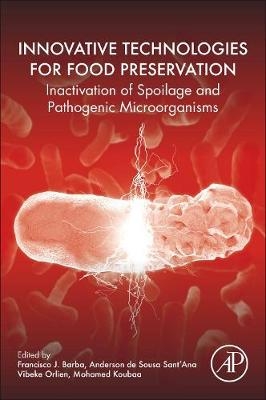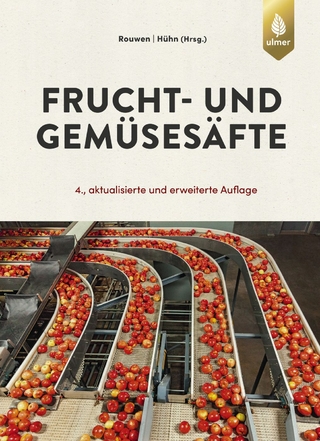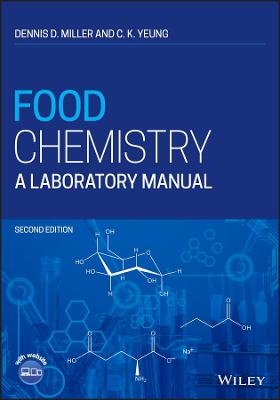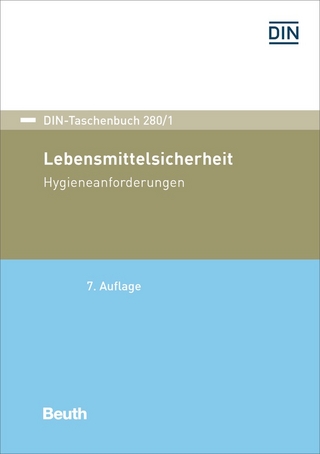
Innovative Technologies for Food Preservation
Academic Press Inc (Verlag)
978-0-12-811031-7 (ISBN)
Over the course of the 20th century, the interest and demand for the development and application of new food preservation methods has increased significantly. The research in the last 50 years has produced various innovative food processing technologies and the use of new technologies for inactivation of spoilage and/or pathogenic microorganisms will depend on several factors. At this stage of development there is a need to better understand the mechanisms that govern microbial inactivation as induced by new and innovative processing technologies, as well as suitable and effective conditions for inactivating the microorganism.
Dr. Francisco J. Barba is an associate professor in Nutrition and Food Science, Faculty of Pharmacy, University of Valencia, Spain. He holds an European Ph.D. (with distinction) from the University of Valencia and he hold degrees in Pharmacy, Food and Technology. He performed postdoctoral stays in the Université de Technologie de Compiègne (UTC), Département de Génie des Procédés Industriels, Laboratoire Transformations Intégrées de la Matière Renouvelable (Compiegne, France) and Marie Curie IEF in the Department of Food Chemistry (University of Copenhagen) to explore different non-thermal applications for preserving and extracting bioactive compounds from plant food materials and by products. Prior to his current appointment, he was also engaged as a visiting researcher in the Department of Food Biotechnology and Food Process Engineering in Technological University of Berlin, Germany. His research focus is on non-thermal processing for preservation and/or extraction of bioactive compounds from liquid and solid food. He has more than 280 publications, including more than 200 published or accepted peer reviewed papers in international journals in the Food Science and Technology area (hindex=43, SCOPUS). He is included in the Highly Cited Researchers 2019 list, the latest classification of the Clarivate Analytics bibliometric data provider. Nowadays, Dr. Barba is serving as Associate Editor of the prestigious Journals “Food Research International, "Journal of Food Composition and Analysis", "Journal of Food Processing and Preservation", “Molecules and "Frontiers in Nutrition", among others. Assistant Professor in Food Microbiology at the Department of Food Science, Faculty of Food Engineering, University of Campinas, Brazil. He has a Bachelor degree in Industrial Chemistry (USS, Brazil), Master of Science in Food Science (UNICAMP, Brazil) and PhD in Food Science (USP, Brazil), including a one-year internship at Rutgers - The State University of New Jersey (New Brunswick, USA). He was a postdoctoral fellow at the University of Sao Paulo and currently he is involved in teaching (graduate and undergraduate) students at UNICAMP and his major interests are focused on quantitative aspects of food microbiology and safety, including predictive food microbiology, microbial risk assessment and meta-analysis. Dr Sant'Ana has published over 55 peer-reviewed articles and currently serves as Editor-in-Chief of the scientific journals Food Research International and Current Opinion in Food Science. Associate Professor and Head of Food Chemistry section, Department of Food Science, Faculty of Science, University of Copenhagen. Her research areas are thermodynamics in food chemistry with emphasis on HP methods in food processing and the effects on food components and their properties, including oxidative stability and protein modification. She has been leader of several national and international projects. She has been supervisor of several BSc theses, MSc theses, PhD students and postdoc people. She has 39 publications in international journals with peer review, 10 articles in trade journals, 7 appearances in Danish media (Newspaper or TV channels), and 3 recent oral presentations at international conferences. Dr. Koubaa is a researcher and assistant professor in Process Engineering at the School of Organic and Mineral Chemistry (Compiègne, France). He carried out various postdoctoral research stays at the University of Technology of Compiègne (Compiègne, France), at the University of the State of Ohio (Columbus, Ohio, United States), and at the National School of 'Engineers of Sfax (Sfax, Tunisia). His research mainly focuses on the treatment of plant and microbial biomass by emerging technologies (pulsed electric fields, ultrasound, etc.) for the extraction of compounds of interest, and the improvement of fermentation and preservation conditions. He has more than 90 publications (book, book chapters and scientific articles in peer-reviewed international journals).
PART A: Introduction 1. Conventional technologies 2. Main groups of microorganisms of relevance for food safety and stability 3. Spoilage non-spore forming bacteria 4. Spoilage spore forming bacteria 5. Pathogenic non-spore forming bacteria
PART B: Microbial inactivation after innovative processing of the main groups of microorganism of relevance for food safety and stability 1. Mechanisms of microbial inactivation by emerging technologies 2. Effects on innovative processing technologies on microbial targets based on food categories: differences between traditional methods of food preservation and emerging technologies 3. Designing, modelling and optimizing processes to ensure microbial safety and stability through emerging technologies
PART C: Consumer’s, technological, environmental and regulatory aspects of application of emerging technologies for food preservation 7. Consumer acceptance and marketing of foods processed through emerging technologies 8. Environmental footprint of emerging technologies, regulatory and legislative issues 9. Technological hurdles and research pathways on emerging technologies for food preservation
| Erscheinungsdatum | 30.09.2017 |
|---|---|
| Verlagsort | San Diego |
| Sprache | englisch |
| Maße | 152 x 229 mm |
| Gewicht | 520 g |
| Themenwelt | Technik ► Lebensmitteltechnologie |
| ISBN-10 | 0-12-811031-7 / 0128110317 |
| ISBN-13 | 978-0-12-811031-7 / 9780128110317 |
| Zustand | Neuware |
| Haben Sie eine Frage zum Produkt? |
aus dem Bereich


